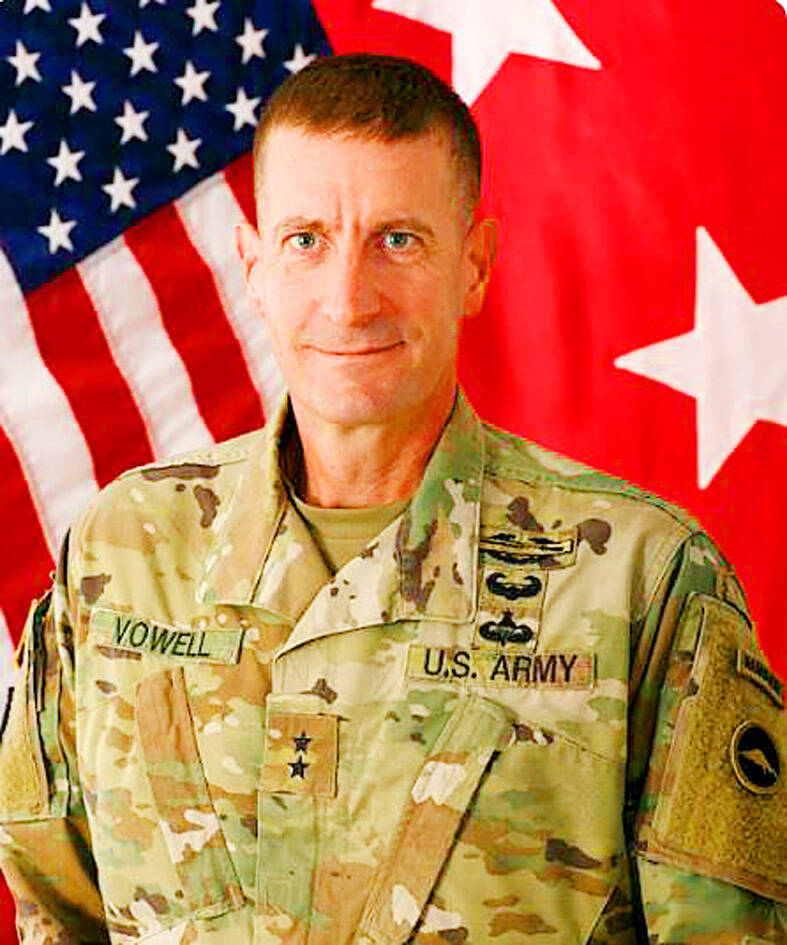US law prescribes that it provide training for the military systems it sells Taiwan, although its military assistance differs from that it has provided Ukraine, US Army Japan Commanding General Joel Vowell said on Thursday.
The US Army Japan stands in for the US Army with partners Taiwan, South Korea, Japan and the Philippines “on the knife edge of freedom” near authoritarian North Korea, Russia and China, Vowell told a virtual news briefing held by the US Department of State’s Asia-Pacific Media Hub on the US Army’s role in Japan and next month’s Land Forces Pacific Symposium and Exposition in Honolulu, Hawaii.
He began his remarks by showing a rotated “lid map” with continental Asia at the bottom, emphasizing the first island chain stretching from Russia to the South China Sea.

Photo: screen grab from the US-Asia Pacific Media Hub’s Twitter account
The US Army Japan’s role is to “provide crisis response options” for any threats in the region to assure allies and deter aggression, and to ensure interoperability with the Japanese military, he said.
Asked about reports that more than 200 US military personnel are stationed in Taiwan and the possibility of including the nation in joint drills, Vowell emphasized the legal component of the US-Taiwan military relationship.
“We’ve historically had a military and State Department presence through AIT [American Institute in Taiwan], and that’s generally been as required by law,” he said.
The US’ Taiwan Relations Act prescribes training to use the military systems purchased by Taiwan, he added.
For example, if the US sold a tank to Taiwan, it would send trainers — defense contractors or military personnel — to teach how to operate, shoot, move, communicate with and maintain it, Vowell said.
“That’s what the law prescribes us to do,” he added.
“Not recognizing Taiwan as a country is the United States policy and has been since the Taiwan Relations Act,” but the US military has been working with the State Department and the AIT to “make sure they understand a framework for a potential defense,” he said.
This is different from joint exercises with Ukraine in 2015, in which the US military trained Ukrainian regiments on tactical operations, he added.
In related news, a study last month showed that about half of Japanese believe the US would intervene if China were to invade Taiwan, while 61 percent said they were concerned about China’s territorial ambitions.
Published on March 29, the study jointly conducted by the Chicago Council on Global Affairs and the Japan Institute of International Affairs compared survey findings from December 2021 and September last year.
The survey last year showed that 52 percent of respondents said the US would intervene in an attack on Taiwan, down from 55 percent in 2021.
The share of participants who said they fear China’s territorial ambitions was similar to the 55 percent who in the 2021 survey saw China’s development into a world power as a critical threat to Japan, it said.
Asked the same question in another survey, 52 percent of Americans believed China’s territorial ambitions to be a critical threat.

MAKING WAVES: China’s maritime militia could become a nontraditional threat in war, clogging up shipping lanes to prevent US or Japanese intervention, a report said About 1,900 Chinese ships flying flags of convenience and fishing vessels that participated in China’s military exercises around Taiwan last month and in January have been listed for monitoring, Coast Guard Administration (CGA) Deputy Director-General Hsieh Ching-chin (謝慶欽) said yesterday. Following amendments to the Commercial Port Act (商港法) and the Law of Ships (船舶法) last month, the CGA can designate possible berthing areas or deny ports of call for vessels suspected of loitering around areas where undersea cables can be accessed, Oceans Affairs Council Minister Kuan Bi-ling (管碧玲) said. The list of suspected ships, originally 300, had risen to about 1,900 as

Japan’s strategic alliance with the US would collapse if Tokyo were to turn away from a conflict in Taiwan, Japanese Prime Minister Sanae Takaichi said yesterday, but distanced herself from previous comments that suggested a possible military response in such an event. Takaichi expressed her latest views on a nationally broadcast TV program late on Monday, where an opposition party leader criticized her for igniting tensions with China with the earlier remarks. Ties between Japan and China have sunk to the worst level in years after Takaichi said in November that a hypothetical Chinese attack on Taiwan could bring about a Japanese

MORE RESPONSIBILITY: Draftees would be expected to fight alongside professional soldiers, likely requiring the transformation of some training brigades into combat units The armed forces are to start incorporating new conscripts into combined arms brigades this year to enhance combat readiness, the Executive Yuan’s latest policy report said. The new policy would affect Taiwanese men entering the military for their compulsory service, which was extended to one year under reforms by then-president Tsai Ing-wen (蔡英文) in 2022. The conscripts would be trained to operate machine guns, uncrewed aerial vehicles, anti-tank guided missile launchers and Stinger air defense systems, the report said, adding that the basic training would be lengthened to eight weeks. After basic training, conscripts would be sorted into infantry battalions that would take

DEEP-STRIKE CAPABILITY: The scenario simulated a PLA drill that turned into an assault on Taiwan’s critical infrastructure, with the launchers providing fire support Taiwan yesterday conducted this year’s first military exercises at Longsiang Base in Taichung, demonstrating the newly acquired High Mobility Artillery Rocket System’s (HIMARS) ability to provide fire support and deep-strike capabilities. The scenario simulated an attack on Penghu County, with HIMARS trucks immediately rolling into designated launch areas and firing barrages at the Wangan (望安) and Cimei (七美) islands, simulating the provision of fire support against invading forces. The HIMARS are supposed to “fire and leave,” which would significantly increase personnel and equipment survivability, a military official said. The drill simulated an exercise launched by the Chinese People’s Liberation Army (PLA) Eastern